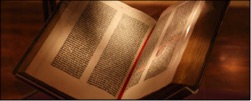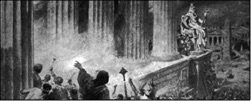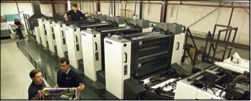




In due time the boats were lowered; but as standing in his shallop’s stern, Ahab just hovered upon the point of the de- scent, he waved to the mate,—who held one of the tackle- ropes on deck—and bade him pause.
“Starbuck!
"Sir?
"For the third time my soul’s ship starts upon this voyage, Starbuck."... “Truth, sir: saddest truth.”
“Some men die at ebb tide; some at low water; some at the full of the flood;—and I feel now like a billow that’s all one crested comb, Starbuck. I am old;—shake hands with me, man.” Their hands met; their eyes fastened; Starbuck’s tears the glue.
“Oh, my captain, my captain!—noble heart—go not—go not!—see, it’s a brave man that weeps; how great the agony of the persuasion then!”
“Lower away!”—cried Ahab, tossing the mate’s arm from him. “Stand by the crew!”
In an instant the boat was pulling round close under the stern.
“The sharks! the sharks!” cried a voice from the low cabin- window there; “O master, my master, come back!”
But Ahab heard nothing; for his own voice was high-lifted then; and the boat leaped on.
Yet the voice spake true; for scarce had he pushed from the ship, when numbers of sharks, seemingly rising from out the dark waters beneath the hull, maliciously snapped at the blades of the oars, every time they dipped in the water; and in this way accompanied the boat with their bites. It is a thing not uncommonly happening to the whale-boats in those swarm- ing seas; the sharks at times apparently following them in the same prescient way that vultures hover over the banners of marching regiments in the east. But these were the first sharks that had been observed by the Pequod since the White Whale had been first descried; and whether it was that Ahab’s crew were all such tiger-yellow barbarians, and therefore their flesh more musky to the senses of the sharks—a matter sometimes well known to affect them,—however it was, they seemed to follow that one boat without molesting the others.
“Heart of wrought steel!” murmured Starbuck gazing over the side, and following with his eyes the receding boat—”canst thou yet ring boldly to that sight?—lowering thy keel among ravening sharks, and followed by them, open-mouthed to the chase; and this the critical third day?—For when three days flow together in one continuous intense pursuit; be sure the first is the morning, the second the noon, and the third the evening and the end of that thing—be that end what it may. Oh! my God! what is this that shoots through me, and leaves me so deadly calm, yet expectant,—fixed at the top of a shud- der! Future things swim before me, as in empty outlines and skeletons; all the past is somehow grown dim. Mary, girl! thou fadest in pale glories behind me; boy! I seem to see but thy eyes grown wondrous blue. Strangest problems of life seem clearing; but clouds sweep between—Is my journey’s end com- ing? My legs feel faint; like his who has footed it all day. Feel thy heart,—beats it yet? Stir thyself, Starbuck!—stave it off— move, move! speak aloud!—Mast-head there! See ye my boy’s hand on the hill?—Crazed;—aloft there!—keep thy keenest eye upon the boats:— mark well the whale!—Ho! again!— drive off that hawk! see! he pecks—he tears the vane”—point- ing to the red flag flying at the main-truck—”Ha! he soars away with it!—Where’s the old man now? see’st thou that sight, oh Ahab!—shudder, shudder!”
The boats had not gone very far, when by a signal from the mast-heads—a downward pointed arm, Ahab knew that the whale had sounded; but intending to be near him at the next rising, he held on his way a little sideways from the vessel; the becharmed crew maintaining the profoundest silence, as the head-beat waves hammered and hammered against the op- posing bow.
“Drive, drive in your nails, oh ye waves! to their uttermost heads drive them in! ye but strike a thing without a lid; and no coffin and no hearse can be mine:—and hemp only can kill me! Ha! ha!”
Suddenly the waters around them slowly swelled in broad circles; then quickly upheaved, as if sideways sliding from a submerged berg of ice, swiftly rising to the surface. A low rum- bling sound was heard; a subterraneous hum; and then all held their breaths; as bedraggled with trailing ropes, and harpoons, and lances, a vast form shot lengthwise, but obliquely from the sea. Shrouded in a thin drooping veil of mist, it hovered for a moment in the rainbowed air; and then fell swamping back into the deep. Crushed thirty feet upwards, the waters flashed for an instant like heaps of fountains, then brokenly sank in a shower of flakes, leaving the circling surface creamed like new milk round the marble trunk of the whale.
“Give way!” cried Ahab to the oarsmen, and the boats darted forward to the attack; but maddened by yesterday’s fresh irons that corroded in him, Moby Dick seemed combinedly pos- sessed by all the angels that fell from heaven. The wide tiers of welded tendons overspreading his broad white forehead, be- neath the transparent skin, looked knitted together; as head on, he came churning his tail among the boats; and once more flailed them apart; spilling out the irons and lances from the two mates’ boats, and dashing in one side of the upper part of their bows, but leaving Ahab’s almost without a scar.
While Daggoo and Queequeg were stopping the strained planks; and as the whale swimming out from them, turned, and showed one entire flank as he shot by them again; at that moment a quick cry went up. Lashed round and round to the fish’s back; pinioned in the turns upon turns in which, during the past night, the whale had reeled the involutions of the lines around him, the half torn body of the Parsee was seen; his sable raiment frayed to shreds; his distended eyes turned full upon old Ahab.
The harpoon dropped from his hand.
Moby Dick by Hermann Melville
Follow Us
1-818-631-9028
